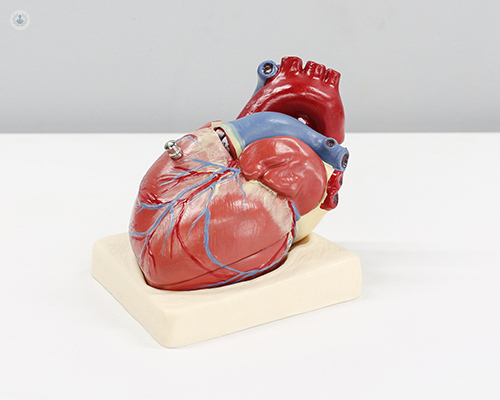What can cause palpitations? An expert explains
Written in association with:In his latest online article, highly esteemed consultant cardiologist Dr Arjun Ghosh offers his expert advice regarding palpitations. He lets patients know what can cause palpitations, what is happening inside the heart when they’re experiencing palpitations, and how palpitations are treated.

Can anxiety or stress cause palpitations?
Anxiety and stress can indeed cause palpitations. Often, these palpitations are benign, meaning they are harmless. It could simply be that the patient is more aware of their heartbeat than usual. Occasionally, the palpitations can be more pronounced than a normal heartbeat. They may indicate an abnormal heart rhythm triggered by stress and anxiety, although this is rarer. Nonetheless, if you are concerned, seeking medical advice is advisable.
What are other possible causes of palpitations?
There are numerous causes for palpitations. As discussed, they could be related to anxiety. Additionally, they could stem from issues with the heart's wiring. This can lead to palpitations occurring at rest, during exertion, or due to stimulants such as caffeine and alcohol. Lifestyle factors like stress, being overweight, and sleep problems can also increase susceptibility to palpitations.
What is happening inside the heart when you experience palpitations?
Palpitations involve an abnormal perception of the heartbeat. Sometimes, it's simply a perception of the normal heart beating faster than usual, like after brisk exercise. Other times, palpitations can signal a problem with the heart's wiring, causing an abnormal electrical connection and rhythm. This abnormal rhythm can manifest as a faster or slower heartbeat, extra beats, or even pauses, leading to sensations of light-headedness or dizziness.
When should I be worried about palpitations?
If palpitations occur with stress, it might be a normal response. However, if they accompany dizziness, or light-headedness, or occur during exercise, it could indicate an abnormal heart rhythm. Seeking medical advice in such cases is crucial.
Is there any way to stop or reduce palpitations when you experience them?
The approach depends on the cause of palpitations. For stress-induced palpitations, calming techniques like deep breathing or removing oneself from stressful situations can help. If they're due to an abnormal rhythm, similar calming strategies can be beneficial. In cases of diagnosed abnormal heart rhythms, specific manoeuvres like blowing into a paper bag or neck rubs may help, but only under medical guidance.
How will a doctor treat palpitations?
Treatment varies based on the underlying cause. If stress-related, methods to decrease stress levels may be recommended. Hormonal issues might require medication. For abnormal heart rhythms, medication is usually the first line of treatment. In some cases, procedures like ablation, which removes abnormal heart tissue, may be necessary for a cure.
Dr Arjun Ghosh is a renowned consultant cardiologist based in London. If you would like to book a consultation with Dr Ghosh, you can do so today via his Top Doctors profile.


